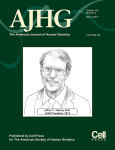 In August, the U.S. Office of Research Integrity announced that a former postdoctoral fellow at the National Human Genome Research Institute (NHGRI) doctored data in two published papers.
In August, the U.S. Office of Research Integrity announced that a former postdoctoral fellow at the National Human Genome Research Institute (NHGRI) doctored data in two published papers.
It took one journal a little longer than five months to remove the researcher’s name from the co-author list, and replace one figure.
It took the second journal more than eight months to retract the paper.
Here’s the notice for “A BLOC-1 Mutation Screen Reveals that PLDN Is Mutated in Hermansky-Pudlak Syndrome Type 9,” published by the American Journal of Human Genetics (AJHG):
The United States Office of Research Integrity (US ORI) found that Andrew R. Cullinane, Ph.D., “falsified and/or fabricated the results in Figure 3C, by using the same gel images to represent expression of PLDN in fibroblasts and melanocytes.” This finding was published in the US Federal Register (81 FR 59642) on August 30, 2016:
https://www.federalregister.gov/documents/2016/08/30/2016-20834/findings-of-researchmisconduct.
Dr. Cullinane entered into a voluntary agreement with the US ORI and his former employer, the US National Institutes of Health. This agreement included the correction or retraction of the AJHG paper. AJHG policy requires retraction of papers where falsification and/or fabrication has been demonstrated. William A. Gahl, director of the laboratory involved, is therefore retracting this article on behalf of the author team. The authors apologize to the community for this publication.
Andrew R. Cullinane did not respond to correspondence about this retraction.
The 2011 paper has been cited 61 times — 13 since September 2016, when the ORI finding was announced, according to Clarivate Analytics’ Web of Science, formerly part of Thomson Reuters.
According to the ORI’s report, Cullinane agreed to retract or correct both papers.
When we contacted the journal in August to let them know about the ORI’s finding, it told us it hadn’t heard about it yet, but would work with the coauthors to “modify their publication appropriately.”
The editor of the journal alerted us to the retraction himself, but has declined to comment on why it took eight months to take action — which, to be fair, is not unusual. Last month, we ran a story about three journals that had taken no action eight months after a university asked them to retract papers by one researcher.
Like Retraction Watch? Consider making a tax-deductible contribution to support our growth. You can also follow us on Twitter, like us on Facebook, add us to your RSS reader, sign up on our homepage for an email every time there’s a new post, or subscribe to our daily digest. Click here to review our Comments Policy. For a sneak peek at what we’re working on, click here.